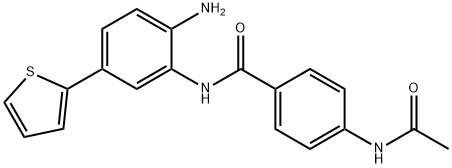849234-64-6
 849234-64-6 結(jié)構(gòu)式
849234-64-6 結(jié)構(gòu)式
基本信息
Merck60
BRD 6929
Compound-60
BRD 6929
COMPOUND-60
4-acetamido-N-(2-amino-5-(thiophen-2-yl)phenyl)benzamide
Benzamide, 4-(acetylamino)-N-[2-amino-5-(2-thienyl)phenyl]-
| 報(bào)價(jià)日期 | 產(chǎn)品編號(hào) | 產(chǎn)品名稱 | CAS號(hào) | 包裝 | 價(jià)格 |
| 2025/02/08 | HY-100719 | BRD 6929;COMPOUND-60 BRD-6929 | 849234-64-6 | 1mg | 198元 |
| 2025/02/08 | HY-100719 | BRD 6929;COMPOUND-60 BRD-6929 | 849234-64-6 | 10mM * 1mLin DMSO | 456元 |
| 2025/02/08 | HY-100719 | BRD 6929;COMPOUND-60 BRD-6929 | 849234-64-6 | 5mg | 590元 |
常見問題列表
|
HDAC1 1 nM (IC 50 ) |
HDAC2 8 nM (IC 50 ) |
HDAC3 458 nM (IC 50 ) |
HIV-1
|
In vitro?IC 50 for HDAC1-9 by BRD-6929 using recombinant human HDAC enzymes and HDAC class-specific substrates. BRD-6929 and substrate are incubated for 180 min (HDAC1-3)?to control for HDAC1-3 inhibition, BRD-6929 is against HDAC1, HDAC2, HDAC3 and HDAC4-9 with IC 50 s of 0.001 μM, 0.008 μM, 0.458 μM and >30 μM, respectively. In vitro?binding affinity (K i ) and kinetics (half-life ‘T 1/2 ′?in minutes) for HDAC 1, 2 and 3 incubated with BRD-6929 (10 μM), the K i values are <0.2 nM, 1.5nM, and 270 nM for HDAC 1, 2 and 3, respectively. The T 1/2 values are >2400 mins, >4800 mins, and 1200 mins for HDAC 1, 2 and 3, respectively. BRD-6929 (1 and 10 uM) does not cause an increase or decrease in overall cell number in brain region specific primary cultures. Additionally, BRD-6929 (10 uM) causes an increase in H4K12 acetylation in brain region specific primary cultures (striatum).BRD-6929 (1-10 uM; 6 hours) causes a significant increase in H2B acetylation in primary neuronal cell cultures. BRD-6929 (1-20 uM; 24 hours) induces a dose-dependent acetylation of H4K12ac with an EC 50 of 7.2 μM in cultured neurons.BRD-6929 potentiates the efficacy of gnidimacrin (a PKC Agonist) against latent HIV-1.
BRD-6929 (intraperitoneal?injection; 45 mg/kg; single dose) exhibits a C max , T 1/2 and AUC values of 17.7 μM, 7.2 hours, and 25.6 μM/L*hr, respectively in plasma. It shows a C max , T 1/2 and AUC values of 0.83 μM, 6.4 hours, and 3.9 μM/L*hr, respectively in brain.BRD-6929 (intraperitoneal?injection; 45 mg/kg; 10 days) acts as a deacetylase inhibitor in mouse brain. It significantly increases acetylation in each brain region by 1.5- to 2.0-fold compared to vehicle. The western blotting reveals that BRD-6929 significantly increases acetylation of histone H2B (tetra-acetylated), H3K9 and H4K12 in cortex, ventral striatum and hippocampus after the 10th daily treatment in adult male C57BL/6J mice.